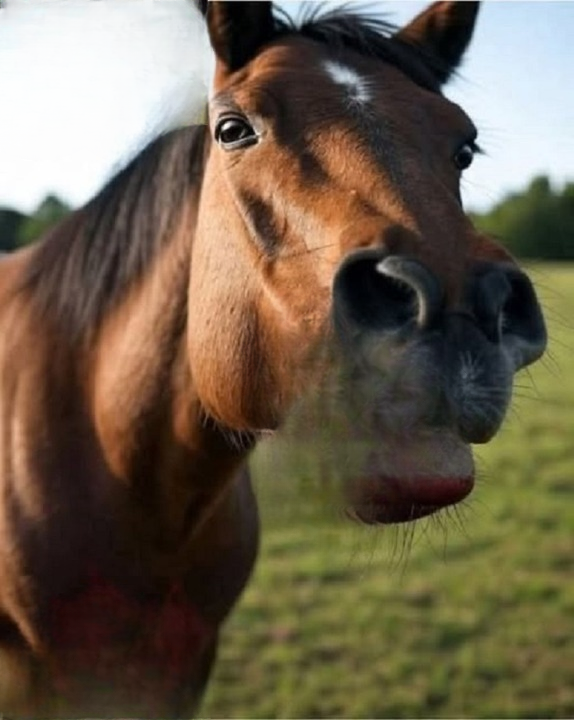In the farthest stretch of the countryside, where the air smells faintly of rain even on clear days and the hills fold into one another like sleeping giants, there lingers a story people still whisper. It is not just a tale of man and beast, but of how curiosity can awaken something that cannot easily be forgotten. They call it “The Horse That Remembered Dusee.”
No one is certain where it began. Some say it started as a warning, passed quietly between farmers over wooden fences. Others insist it came from a single man’s diary, found decades later, the words barely legible but the meaning unmistakable. Whichever version you hear, one thing is certain — the story was not made to frighten. It was made to remind.
A Man of the Earth
Long before the story became a whisper, there was a man named Dusee — a quiet farmer whose world was measured in acres, seasons, and the rhythm of hard work. His hands were worn from decades of tilling the same soil his father had tended before him. The land was his companion, and silence his language.
He lived alone on a modest stretch of farmland bordered by a narrow forest on one side and a stream on the other. The neighbors often said Dusee seemed content with what little he had — a cottage, a field, a few hens, and a heart full of patience. His laughter was rare but genuine, like sunlight breaking through the clouds.
Dusee’s life followed the dependable pattern of dawn and dusk until the day the horse arrived.
The Stranger in the Mist
It happened after a long storm — the kind that seems to wash away the edges of the world. When the skies cleared, and the morning light fell softly over the soaked earth, Dusee found something standing at the edge of his property.
It was a horse — tall, strong, and beautiful in an unfamiliar way. Its coat shimmered faintly, almost silver, though no one could tell whether it was the color or the morning mist playing tricks on the eyes. Its mane moved gently in the breeze, as though it carried its own quiet energy.
No rope, no saddle, no sign of an owner. Just a creature waiting, watching.
When Dusee approached, the horse didn’t flinch. It simply looked at him, its gaze calm and steady. Something about its stillness drew him closer — not fear, but a peculiar sense of recognition, as though the two had met before in some forgotten place.
Without a word, he led it home.
Mercy
Dusee named the horse Mercy — a name that carried a quiet hope. The villagers raised their eyebrows when they heard it. Mercy was not a common name for an animal, especially not one that appeared out of nowhere. But Dusee only smiled and said, “It suits her. She found me when I wasn’t looking for anything.”
At first, everything seemed ordinary. Mercy obeyed commands, helped plow the fields, and walked beside Dusee with gentle grace. But the villagers began to notice odd details. The horse never seemed to eat much. The grass in its paddock remained untouched, the trough never drained. When asked, Dusee laughed softly and said, “She eats when I’m not watching. Some creatures are shy that way.”
He said it as a joke, but over time, even Dusee’s laughter began to change — quieter, thinner, as though it carried a weight he couldn’t name.
The Shift in the Air
The weeks rolled on. Dusee grew more withdrawn. He stopped visiting the market, forgot to collect his letters, and spent more time near the paddock long after sunset. Neighbors sometimes saw him standing motionless beside Mercy, the two of them still as statues in the moonlight.
One evening, his friend Tomas came to check on him. He found Dusee sitting by the fence, his eyes fixed on the horse. “She listens to everything,” Dusee said softly, not turning his head. “Even the things I haven’t said aloud.”
Tomas tried to laugh, but the air around them felt strangely heavy. “You’ve been working too hard,” he said gently. Dusee smiled faintly and replied, “Maybe. Or maybe I’ve finally found something that understands silence better than I do.”
When Tomas returned home, he told his wife that Dusee seemed different — not unhappy, but far away, as if part of him was already somewhere else.
The Morning of the Disappearance
It wasn’t until three days later that anyone realized Dusee was gone. The first morning, people assumed he was working in the fields. The second, they thought he might be unwell. By the third, Tomas and another neighbor, Marta, decided to visit.
The house was neat, the way Dusee always kept it. His tools rested beside the door, polished and ready. The firewood was stacked, his kettle still half-filled with water. But there was no sign of him.
They searched the barn next. Mercy stood in the corner, motionless and silent, her coat gleaming faintly in the morning light. Her eyes — calm as always — seemed to follow them. On the stall’s wooden rail, Dusee’s gloves were folded neatly, as though placed there with care.
It was Tomas who noticed it first — a single mark on the horse’s side. Not a wound, not a scar, just the faint impression of a hand. It shimmered like light caught on metal.
https://syndicatedsearch.goog/afs/ads?sjk=cX0ND63kTlGkpLXkX%2FHwrQ%3D%3D&psid=5134551505&channel=AutoRsVariant&cx=r-d08e2d5dedf354253&fexp=31095106%2C31095609%2C42532523%2C95366175%2C95375933%2C95376297%2C31095633%2C42533293%2C95344789%2C95376120%2C21404%2C17300002%2C17301437%2C17301438%2C17301442%2C17301548%2C17301266%2C72717107%2C73110182%2C73139889&client=pub-8681813503854240&r=m&sct=ID%3Da47d1139d2eaf6c1%3AT%3D1761263187%3ART%3D1761263187%3AS%3DALNI_MbSNoc8PfogIfjHD262Bm3AU-VyUQ&sc_status=6&hl=en&rpbu=http%3A%2F%2Fgoogle.com&rpqp=q&type=3&rs_tt=c&oe=UTF-8&ie=UTF-8&format=r5&nocache=4571762383529188&num=0&output=afd_ads&domain_name=aliacar.net.tr&v=3&bsl=10&pac=2&u_his=3&u_tz=60&dt=1762383529189&u_w=1280&u_h=720&biw=1257&bih=594&psw=1257&psh=17524&frm=0&uio=-&cont=autors-container-0&drt=0&jsid=csa&nfp=1&jsv=827603366&rurl=https%3A%2F%2Faliacar.net.tr%2F2025%2F11%2F05%2Fthe-horse-that-remembered-dusee-a-tale-of-silence-and-shadow%2F&referer=https%3A%2F%2Faliacar.net.tr%2F%3Fs%3DThe%2BHorse%2BThat%2BRemembered%2BDusee%2B%25E2%2580%2594%2BA%2BTale%2Bof%2BSilence%2Band%2BShadow%26fbclid%3DIwY2xjawN4tdpleHRuA2FlbQIxMABzcnRjBmFwcF9pZBAyMjIwMzkxNzg4MjAwODkyAAEe3lcBpdtmQyqOh36jIMBXtSIXY0qBSt5g_kWxZwnM5YiQtZ9N1an-moeVF_g_aem_c42HpjjK2tIb1Soj0pfatQ
Marta touched her friend’s arm. “We should go,” she whispered. And they did.
Echoes in the Night
In the days that followed, Mercy remained in the field, quiet and still. The villagers left her alone, unsure what to do. Then, one by one, people began to hear it — faint hoofbeats echoing at night, though no one had seen her move.
Some said the sound came from the forest. Others claimed it circled the village, steady and rhythmic, as though the horse was walking paths that no longer existed. Yet when morning came, the field remained empty, and the ground showed no tracks.
Eventually, Mercy vanished. Where she had stood, there were four deep impressions in the soil, perfectly spaced and never filling with rain or grass. The villagers avoided the spot after that.
The Vanishing Four
In the weeks that followed, life returned to normal — almost. Then, quietly, four villagers disappeared: a woodsman, a widow, a boy who often brought Dusee bread, and a preacher who had once offered to bless the land.
There were no signs of struggle, no evidence of foul play. Only the sudden absence of those who had once been there. Some said the four had left the village, others whispered they had gone to search for Dusee and lost their way. No one truly knew.
After that, the hoofbeats stopped.
Years of Silence
Over time, the story faded into something people told only when the nights were long and the air was thick with fog. Children grew up hearing it as a bedtime tale, a moral wrapped in mystery. “Be kind to the quiet things,” their elders would say. “And never name what you don’t understand.”
The old folks spoke of Dusee with fondness, not fear. They remembered him as a man who listened more than he spoke — a soul too gentle to guard himself from wonder. They said Mercy wasn’t a curse, but a mirror, sent to remind him — and perhaps everyone — that not all beauty is meant to be possessed.
A Traveler’s Tale
Decades later, a traveler passing through the same countryside stopped at a small inn near the edge of the forest. He’d heard the story in a neighboring town and was curious to see the place for himself. The innkeeper, an older woman with kind eyes, told him that most people no longer spoke of Dusee’s horse.
“It’s not that we’re afraid,” she said, wiping the counter with a cloth. “It’s that some stories deserve rest. But sometimes, the past stirs when someone new listens.”
That night, the traveler took a walk under the stars. The air was calm, the fields quiet. He reached the edge of an open meadow where mist floated just above the ground like pale smoke. For a moment, he thought he saw movement — a shimmer, perhaps, or a trick of the moonlight. Then came the faintest sound — a single, distant hoofbeat.
He waited, listening. The air seemed to breathe around him. Then, just as suddenly, everything went still.
When he returned to the inn, he found the old woman waiting. “You heard it, didn’t you?” she asked. He nodded. She smiled softly. “Then you understand why we don’t call it a ghost story. It’s a memory. And memories never really leave.”
The Preacher’s Diary
Many years after that, during the restoration of an old chapel, a caretaker discovered a small leather-bound book hidden beneath a loose floorboard. Inside were a few pages written in faded ink. The name on the first page was that of the preacher who had once lived in Dusee’s village.
Most of the entries were simple reflections — sermons, weather notes, observations about his congregation. But one entry stood out, dated the week before his disappearance.
“I dreamt of a field that hummed like a song with no words. In the distance, I saw a horse, silver as morning frost. Beside it stood a man I knew — Dusee — smiling faintly, his eyes kind. He said nothing, but I felt peace rather than fear. When I woke, I understood. Some things are not meant to be solved, only remembered.”
The caretaker, moved by the simplicity of those words, placed the diary in a glass case at the chapel’s entrance, where it remains to this day. Visitors sometimes pause to read it, wondering if the preacher’s dream had been a farewell or a blessing.
What the Story Means Now
Over time, “The Horse That Remembered Dusee” stopped being told as a haunting and began being shared as a reflection — about how deeply humans long for connection, even with the unknowable. It became a story about listening, about the quiet power of the natural world, and about respecting mysteries too large for ownership.
Teachers used it to remind children that not every unanswered question is meant to be feared. Folklorists studied it as a symbol of transformation — how one person’s life could ripple through generations without malice or harm. And locals, even today, speak of Dusee not with sorrow, but with gentle reverence.
Sometimes, on misty nights, travelers say they still hear hoofbeats near the fields, faint and steady, like the pulse of time itself. Whether real or imagined, the sound brings comfort more than dread — a reminder that stories endure, carrying the essence of those who once walked before us.
The Last Lesson
There’s a saying now in that countryside — soft, almost like a prayer:
“If you meet the quiet, greet it kindly.”
It’s what parents tell their children when the fog rolls in, what friends say when life feels uncertain. For in the end, the tale of Dusee and Mercy is not about vanishing or fear. It is about understanding that the world is full of wonders that do not belong to us — they simply pass through, leaving traces for us to remember.
The people who tell this story today do not call it a tragedy. They call it a reminder — of humility, of awe, and of the delicate bond between humanity and the unseen.
When the night grows too still and you hear a faint rhythm in the distance, it may just be the world whispering back, keeping time with all the stories that came before.




